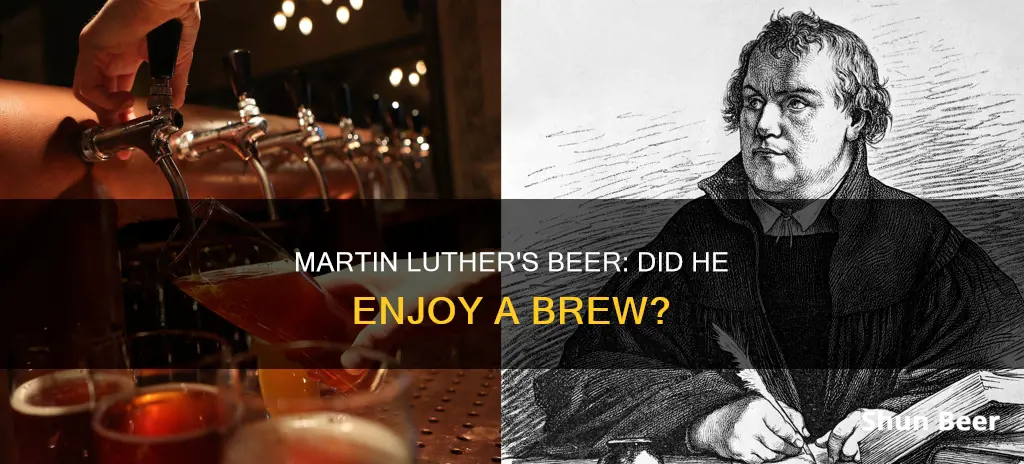
Martin Luther, the 16th-century Christian reformer, is well-known for his love of beer. In fact, he once said, I opposed indulgences and all the papists, but never with force. I simply taught, preached, and wrote God’s Word; otherwise I did nothing. And while I slept, or drank Wittenberg beer with my friends Philip and Amsdorf, the Word so greatly weakened the papacy that no prince or emperor ever inflicted such losses upon it. I did nothing; the Word did everything. Luther's appreciation for beer extended beyond his personal enjoyment, as he also recognised its role in social and cultural life, even using it as an alternative to violence. While he advocated for drinking, he also emphasised the importance of moderation, stating that you should be moderate and sober; this means that we should not be drunken, though we may be exhilarated.
What You'll Learn

Martin Luther's favourite beer was Einbecker
Martin Luther, the famous German priest and reformer, was a lover of beer. While he preferred home-brewed beer, there is only one beer with a claim to be his favourite – Einbecker.
On the evening of 18 April 1521, the day of the eventful stand at Worms, the Duke Erich von Braunschweig sent Luther a pot of Eimbecker (Einbecker) beer, to which he was said to be "specially addicted". Luther also received a gift of Einbecker beer on his wedding day. Luther scholar Luther Peterson recalled a visit to a restaurant in Einbeck, where he saw a beer coaster with portraits of Martin and his wife Katie, and a tale about their receiving a barrel of Einbecker beer as a wedding present.
Einbecker is a line of beers produced by Einbecker Brauhaus AG, the brewing company. The beer is strong and dark, with a cherry-like scent and a sweet taste. It originated from the city of Einbeck in Germany around the 14th century and is one of the oldest breweries in the world. The oldest receipt for the sale of Einbecker beer dates to 28 April 1378.
While the beers enjoyed by Luther in the 16th century would have tasted very different from the Einbecker Ur-Bocks of today, the association with Luther has remained strong. In the 20th century, an Einbecker brewery used a portrait of Luther on its label when its beer was first imported into the US.
Beer and Open Wounds: Is It Safe?
You may want to see also

Luther preferred home-brewed beer
Martin Luther was a big fan of beer. In a sermon on soberness and moderation, he said:
> It is possible to tolerate a little elevation, when a man takes a drink or two too much after working hard and when he is feeling low. This must be called a frolic. But to sit day and night, pouring it in and pouring it out again, is piggish… all food is a matter of freedom, even a modest drink for one’s pleasure. If you do not wish to conduct yourself this way, if you are going to go beyond this and be a born pig and guzzle beer and wine, then, if this cannot be stopped by the rulers, you must know that you cannot be saved. For God will not admit such piggish drinkers into the kingdom of heaven.
Luther's preference for home-brewed beer is well-documented. After he married, his wife Katie brewed beer as the lay brothers had brewed it in days gone by. Luther Peterson notes that Martin often began his written invitations to friends with the note that Katie had made him another barrel of beer. Luther also wrote to Katie about some bad beer he had drunk "which did not agree with me... I said to myself what good wine and beer I have at home, and also what a pretty lady, or lord." Luther also drank the local beer with friends, noting in one sermon delivered at Wittenberg in 1522:
> I opposed indulgences and all the papists, but never with force. I simply taught, preached and wrote God’s Word; otherwise I did nothing. And while I slept (an allusion to Mark 4:27), or drank Wittenberg beer with my friends Philip and Amsdorf, the Word so greatly weakened the papacy that no prince or emperor ever inflicted such losses upon it.
Luther also drank home-brewed beer for its laxative qualities, writing to Katie about the excellent local beer that gave him "three bowel movements in three hours". On another occasion, he wrote to say how well he was sleeping because of the local beer, but that he was as "sober as in Wittenberg".
Luther was also concerned with sustainability, noting that brewing could deplete natural resources. He believed that brewing led farmers to grow woad, a plant used for dyeing, instead of grain, and that this "has so burned and exhausted the soil that it is beyond all reason".
So, while Luther was a big fan of beer, he preferred it to be home-brewed, and he was also mindful of the environmental impact of brewing.
Beer and Tylenol: Safe Mix?
You may want to see also

Luther's wife, Katherina, brewed beer
Martin Luther, the German reformer, was a man of many talents and interests. He was a keen musician, an accomplished lute player, and a composer of hymns. Luther was also an avid beer enthusiast and often wrote about his love for the beverage. In fact, he once advised a young man who wrote to him about his despair at the prospect of going to hell to get drunk. Luther himself drank beer to help with his insomnia and constipation.
Luther's wife, Katharina von Bora, also known as Katharina Luther, shared her husband's love for "home-brewed" beer. After their marriage, Katharina brewed beer for their household, just as the lay brothers had done in the past. Luther often mentioned his wife's brewing skills in his letters and noted that he missed their home-brewed beer when he was away. He also praised the laxative and sedative qualities of certain beers, which helped him with his health issues.
Katharina's brewing skills were not limited to beer, as she also brewed ales with medicinal herbs to help her husband when he was ill. Luther was so pleased with his wife's brewing prowess that he once wrote, "I keep thinking what good wine and beer I have at home, as well as a beautiful wife." He even went as far as to say that he wished brewing had never been invented because it consumed a lot of grain, but he still enjoyed a good beer.
Katharina von Bora played a significant role in the Protestant Reformation, and her marriage to Luther set a precedent for Protestant family life and clerical marriage. She was an intelligent and competent woman who, in addition to brewing, managed the household, raised six children, and assisted her husband in running their estate.
Katharina's brewing skills were not just a hobby, but a way to provide for her family and the numerous students and visitors who boarded with them. She even opened a brewery that produced thousands of pints of beer each year, ensuring a steady supply for her husband, even when the local breweries ran dry.
The town of Kutztown, Pennsylvania, honoured Katharina's brewing legacy by creating "Katie Luther's Brew," a dark hefeweizen (wheat) beer based on one of her original recipes. The sale of this beer benefited the United Lutheran Seminary's scholarship fund, showcasing the continued impact of Katharina's brewing talents even today.
Ireland's Green Beer: Fact or Fiction?
You may want to see also

Luther believed beer was good, but too much was bad
Martin Luther was a man of many beliefs, and one of them was that beer was good. He was known to be a beer lover and often drank beer with his friends and family. In fact, he once said, "I did nothing; the Word did everything", referring to how he believed that drinking beer and spreading God's Word were not mutually exclusive.
Luther also believed that beer had several health benefits. In a letter to his wife, Katherina, he wrote about the excellent local beer he had been drinking, which helped him with his constipation and insomnia. He wrote, "I said to myself what good wine and beer I have at home, and also what a pretty lady, or lord". Luther's wife brewed beer at home, and he often invited friends over to drink it, stating in his invitations that his wife had brewed another barrel of beer.
However, Luther also believed that too much beer was bad. He advocated for drinking in moderation and warned against the dangers of excessive alcohol consumption. In his Sermon on Soberness and Moderation, delivered in 1539, he noted:
> "It is possible to tolerate a little elevation, when a man takes a drink or two too much after working hard and when he is feeling low. This must be called a frolic. But to sit day and night, pouring it in and pouring it out again, is piggish… all food is a matter of freedom, even a modest drink for one’s pleasure. If you do not wish to conduct yourself this way, if you are going to go beyond this and be a born pig and guzzle beer and wine, then, if this cannot be stopped by the rulers, you must know that you cannot be saved. For God will not admit such piggish drinkers into the kingdom of heaven".
Luther also believed that drinking too much beer could distract people from more important spiritual matters. In a sermon on the Lord's Prayer, he used beer to illustrate the line "lead us not into temptation", arguing that people might become so concerned with beer that they would neglect their spiritual lives. He said:
> "The 'Master Devil' (Junker Teufel)... tempts you by causing you to disregard God's Word: Oh, I have to look after the beer and malt, I can't go to hear a sermon".
So, while Luther believed that beer was good, he also recognized the importance of drinking in moderation and not allowing it to become a distraction or an addiction.
Drinking Beer at Anfield: What's the Deal?
You may want to see also

Luther advocated for drinking locally-brewed beer
Martin Luther was a big fan of beer. In a sermon on the Lord's Prayer, he used beer to illustrate the line "lead us not into temptation", warning that people might become so concerned with beer that they would be tempted to overlook spiritual matters. Luther told his listeners:
> The 'Master Devil' (Junker Teufel) ... tempts you by causing you to disregard God's Word: Oh, I have to look after the beer and malt, I can't go to hear a sermon.
Luther also advocated for drinking locally brewed beer. In a 1522 sermon, he proposed beer as an alternative to violence, saying:
> I did not use force to spread my ideas but simply taught, preached, and wrote God's Word and then waited for the good results while I 'drank Wittenberg beer with [my] friends.'
Luther's hometown shoutout anticipates modern beer culture's focus on local brewing. In his sermons and table talk, Luther also expressed his preference for home-brewed beer. After Luther married, his wife Katie brewed beer as the lay brothers had brewed it in days gone by. Luther once wrote to Katie about some bad beer he had drunk "which did not agree with me... I said to myself what good wine and beer I have at home, and also what a pretty lady, or lord."
Luther also had strong words for businesspeople and commercial brewers, preaching:
> The word 'steal' includes every kind of advantage, and this commandment applies to every trade and profession... One can commit a theft in these trades just as well as if you climbed in through a back window. It is as much stealing for you to charge too much for the meat... The same applies to tailors, brewers, and others.
Vaccination and Beer: What's Safe to Drink?
You may want to see also
Frequently asked questions
Yes, Martin Luther drank beer. He also advocated for drinking, and advised a young man who wrote to him about despair to get drunk. Luther's favourite beer was Einbecker, and he also enjoyed home-brewed beer made by his wife, Katie.
No, Luther did not like commercial beer. He preferred home-brewed beer, and also beer from monasteries. He also did not like commercial brewers, believing that brewing was a curse for Germany because it consumed a lot of grain.
It is not known how much beer Martin Luther drank per day, but he did drink at home, and with friends. He also suffered from constipation and insomnia, and noted that local beer helped him with these issues.







